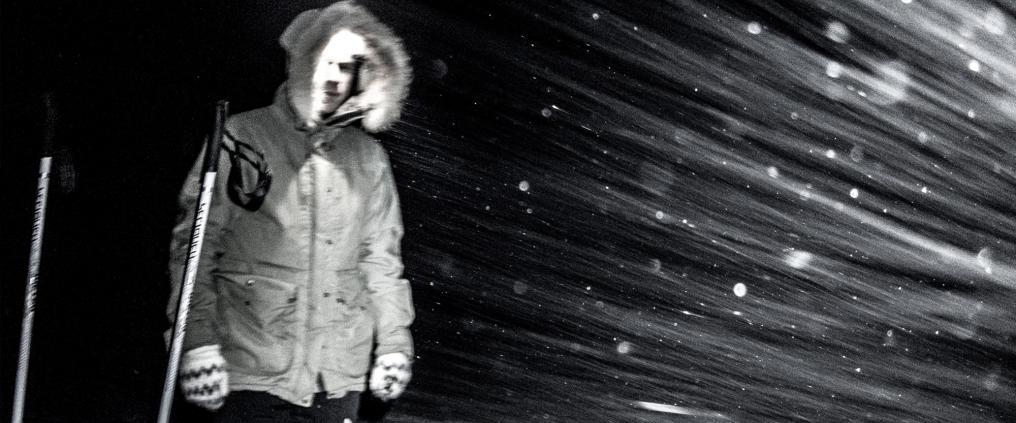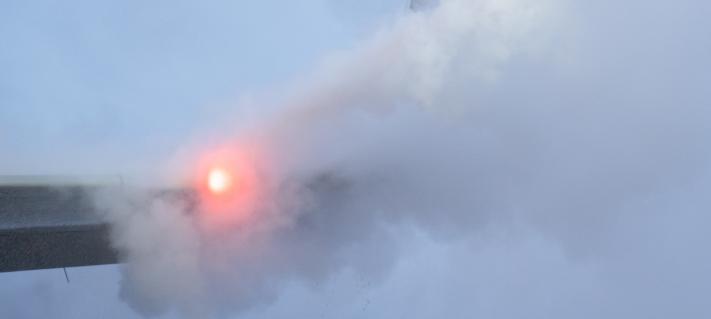At six in the evening, the thermometer shows -38 and the sky is pitch black. We are in Saariselkä, in the north of Finland. Wilderness guide Anton Kalland deftly slides to a stop on the riverbank on his cross‑country skis. The river, 1.5 metres deep, is full of water so crystal clear that you can see the river bottom as if no water were covering it. Water keeps flowing even when it is this cold. Anton casually throws a snowball in the river. He couldn't possibly guess that the Hungarian sheepdog accompanying the expedition would jump after it! After his dive, the dog freezes into a furry ball, but his life is saved by the presence of a nearby wilderness cabin.
The following morning the mood is different. The temperature has fallen far below freezing and the air is filled with tiny crystals that reflect the light of the rising sun (the sun rises only around 11 am in Northern Finland from December to January, but during the darkest period of polar night, in the weeks before and after New Year's, it does not reach the horizon at all). When you spend long enough in this glittery haze with its ice-crystal stars, the tiny diamonds dancing in the air start to decorate your clothes.
The feeling of cold can be entirely in your mind.
Anton has taken groups of first-timers with him on his journeys. He has been privileged to witness many a rebirth on these expeditions. The first night in the pitch dark of night and bone-chilling temperature takes many by surprise, no matter how careful the preparations. An entire day on your skis might have taken every last ounce of your strength, your blood glucose level has ebbed, and breathing feels laborious or even impossible in temperatures so far below zero. There is nothing more to give. You cry.
At that moment, when you believe you have reached the end of your strength, you usually still have about half of that strength left. In reality, the limits of our ability to cope area lot further away than they feel.
When you recognise this, you find more faith in yourself – and get through that first night, to wake up as a renewed person, assures Anton. A person who has a new kind of faith in his or her abilities in all areas of life.
Four pitfuls of snow for one pot of water
A journey into extreme cold is a physical achievement, though, as we have seen, it requires more mental than physical endurance. For that achievement, we can find a friend where we might expect an enemy: fat is very useful in cold climates. The same goes for muscles: they produce the heat that the fat insulates. A person with little muscle and plenty of fat gets just as cold as an athlete who has little or no fat, whose muscles produce heat that just escapes from the body, which has no fat to keep it in.
The body consumes a lot of energy in cold conditions. The bulk of the energy is consumed by shivering, an involuntary muscle response triggered by the feeling of being cold. Shivering multiplies the body's heat production fivefold, but this continuous motion isn't a bad thing – it's vital for survival. It keeps body temperature even, making the human body homeothermic.
If you want to experience polar conditions without leaving Europe, Finnish Lapland is your best bet.
Even after all this, with exactly the right body temperature, you can still feel chilly. Because the feeling of cold can also have a psychological element. Your brain knows that it is cold around you, so you may feel it more. Children, who haven't yet learned to feel the cold or complain, are often so happy about the arrival of autumn and winter that they must be begged to come inside. Our pet dogs too can be taught either to be scared of the cold or to enjoy it.
Finding something to drink in cold conditions is another feat. When on an expedition, you have to melt snow for drinking water. However, the water content of snow is very low at 30–40 degrees below zero: in these conditions, it takes about four pots of snow to make one pot of water! However, good fortune is with the trekker here: Finnish Lapland is full of streams that do not freeze over in winter, so you need only break their ice cover.
It takes routines and courage to cope in extreme cold. At the same time, such an adventure offers a chance to travel back in time, to an age when clocks weren't needed. A wilderness expedition gets you attuned to the rhythm of nature in no time. The darkest days of polar night hand you a meagre four hours of daylight. It feels as if the day/night cycle is compressed and your entire life is condensed into those hours.
Text: Tiia Soininen
Photo: Anton Kalland



